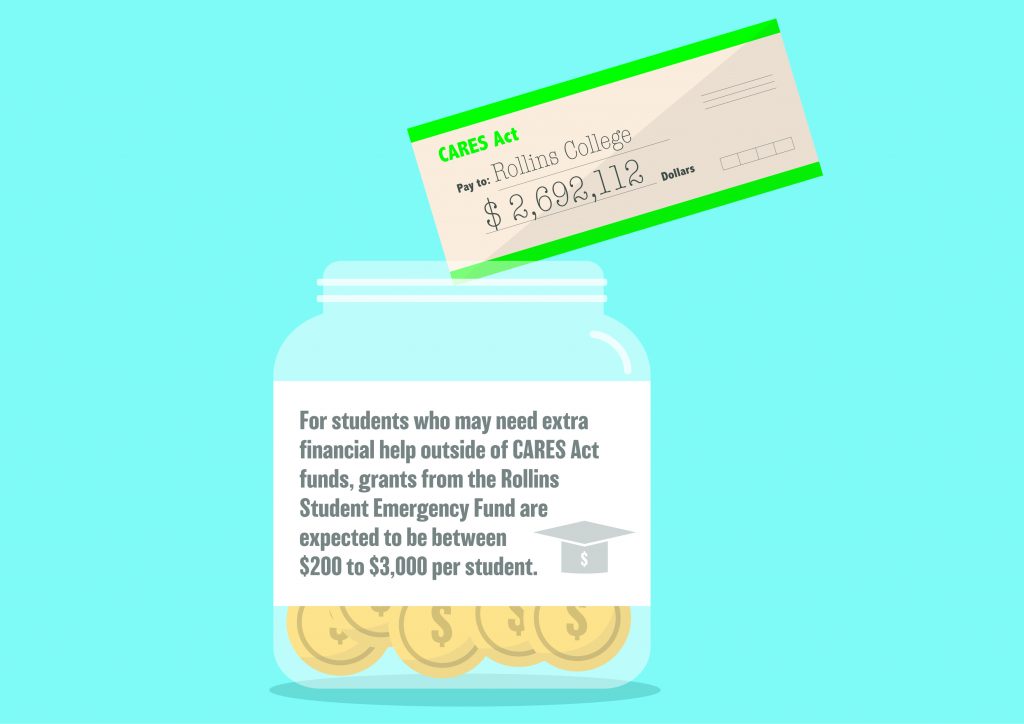Nearly 30 percent of students receive pell grants, qualify for CARE funding and Rollins Student Emergency Fund

Rollins will receive $2,692,112 in total federal coronavirus aid due to the CARES (Coronavirus Aid, Relief, and Economic Security) Act, which was signed by President Donald Trump earlier this month. Exactly 50 percent of the funding ($1,346,056) will go directly to students. The remaining revenue will be used to reimburse the institution for costs associated with the coronavirus.
Meanwhile, tuition is still projected to increase, but Rollins administration hopes that the Coronavirus Aid, Relief, and Economic Security (CARES) Act, along with the Rollins Emergency Fund program, will help students stay on campus next school year.
What is the CARES Act?
U.S. Secretary of Education Betsy DeVos announced earlier this month that, through the CARES Act, more than $6 billion will be allocated to colleges and universities across the country. The goal of these funds is to provide direct emergency cash grants to college students whose educations have been disrupted by the coronavirus outbreak.
Students who are eligible for federal financial aid qualify for CARES Act funding and can apply online here.
The amount of CARES Act-related funding given to each college is determined by the number of students (including current undergraduates and graduates) as well as Federal Pell Grant recipients. Nearly 30 percent of Rollins students are recipients of Pell Grants, making Rollins a prime candidate for federal aid.
While Rollins students who are approved for CARES Act funding will have access to their portions of $1,346,056, students at other colleges in the region will have access to more funds due to college size or need.
For instance, Stetson University students were allocated $1,789,292; Valencia College students were allocated $13,841,102; and students at the University of Central Florida were allocated $25,535,625.
“The actual [CARES Act] funding has not been received yet, but we hope to have the funds within the next couple of weeks and begin delivering grants directly to students,” said Steve Booker, director of Financial Aid, and Ed Kania, vice president for Business and Finance and treasurer, in a joint statement.
Rollins has not received its half ($1,346,056) for institutional costs, either, but Booker and Kania hope to have access to those funds within the next 30 days.
What is the Rollins Student Emergency Fund?
For students who may need extra financial help outside of federal CARES Act funds, grants from the Rollins Student Emergency Fund are expected to be between $200 to $3,000 per student. Students may receive this money as a refund or use it to pay the balance on their account. To apply for the Rollins Student Emergency Fund, click here.
“This is an unprecedented time for everyone. These funds will allow Rollins to continue to deliver on our mission and provide a rigorous and outstanding liberal education,” said Booker and Kania.
Booker and Kania are both heavily involved in the financial strategic planning task force, which is charged with considering financial scenarios and making recommendations per each scenario to President Grant Cornwell.
The task force is co-chaired by Vice President for Institutional Advancement Laurie Houck and Kania, and it includes 10 faculty members and six staff members.
Dean of Students Leon Hayner said, “Staff in the Dean of Students Office, Student and Family Care, and Financial Aid stand ready to provide individualized planning, resources and support to our students and their families.”
Tuition for the 2020-2021 school year
While tuition is still projected to increase next school year, Booker and Kania said, “We understand that there is additional stress and uncertainty for students due to the impact of the coronavirus. In response, the College has set up the Rollins Student Emergency Fund alongside the CARES Act funding … In addition, families may contact the Office of Financial Aid to share their current circumstances and see if additional funding can be provided for Fall 2020 and Spring 2021 semesters.”
Despite the college’s measures to soften the financial blow of COVID-19, some students think that Rollins should reconsider raising tuition.
Raj Singh (‘22) said, “Rollins really needs to rethink [the tuition increase] if the college wants to have a student body from diverse economic backgrounds. Because of the economic hardships caused by the virus, incoming freshmen will need to consider the cost of coming to Rollins. The tuition increase can change their mind.”
Singh added that he worries Rollins may not start on time next semester; if that is the case, then “[students] should not be expected to pay full tuition. The tuition price includes a student’s access to campus facilities. If no student is allowed back on campus, charging full tuition price for online school is unfair,” he said.
Rollins’ Financial Outlook
Rollins faced a projected loss of $3 million due to coronavirus refunds and lack of a steady housing and meal plan revenue, as previously reported.
However, Booker and Kania said that the losses for the year “will be offset by reduced expenditures due to cancelation of faculty and staff travel, reduction in food costs, suspension of discretionary projects and expenditures, and reduction in utility costs since residence halls and many buildings are empty.” In other words, Rollins is facing less of a financial loss than initially projected.
Hayner is looking forward to next year: “My hope is that this combination of support and resources, including CARE Act funding, and creative planning and problem solving, allows all students to return to campus this fall feeling confident they have what they need for success.”
Students can learn more about support funding at https://www.rollins.edu/financial-aid/ and schedule a video conference with an employee in the Department of Financial Aid.























Comments are closed.